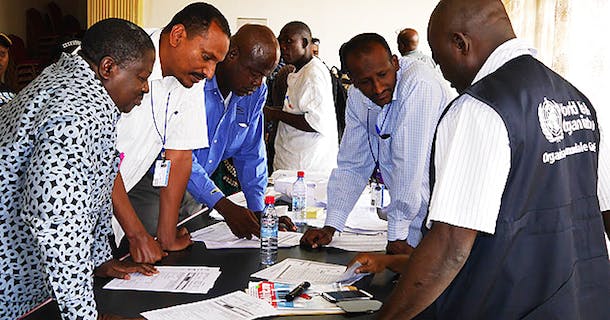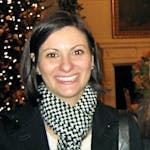
The Measles & Rubella Initiative, of which the United Nations Foundation is a founding partner, works to ensure no child dies from measles or is born with congenital rubella syndrome.
On September 15-16, the initiative held its annual meeting to discuss the challenges and opportunities ahead.
During the meeting, we heard that the initiative has vaccinated over 1.8 billion children against measles since its launch in 2001, and that 15.6 million deaths from 2001-2013 were averted due to measles vaccines – the single greatest reduction to child mortality under Millennium Development Goal 4.
We also heard the sobering news that despite these incredible achievements we are off target on achieving our measles and rubella elimination goals. The annual meeting provided a chance for the measles and rubella community to come together to reflect on what has been accomplished and what still needs to be done to vaccinate every child. At the same time, so many of the presentations were relevant to the larger global health community.
I wished every person with an interest in global health could have heard Dr. Francis Kateh, the Deputy Minister of Health of Liberia, give a presentation on: “Liberia: A Measles Vaccination Campaign in the Context of an Ebola Outbreak.” In the midst of the recent Ebola crisis, Liberia faced a measles outbreak that if went untreated could have killed thousands of children. Thankfully, the Liberian Ministry of Health was able to stop the measles outbreak through a large-scale measles immunization campaign.
Here are three lessons from Liberia’s measles vaccination campaign that can be applied to the broader global health community:
1. Community involvement is essential for success:
During February of this year, there was an increase in measles cases in Liberia. At the same time, Liberians were scared of accessing health services and there was fear and mistrust in the health system. But children needed to be vaccinated, so the Ministry of Health worked in partnership with community leaders, religious groups, and civil society to ensure community members understood, supported, and demanded vaccines.
2. Utilize all the tools in our toolbox:
When working on life-threatening diseases and in devastating situations, we need all of the tools in our toolbox to accomplish our goals. Liberia’s Ministry of Health worked with 14 local and international organizations and used every possible tool to help vaccinate children against measles. Volunteers went house to house and town criers went village to village to announce details of the vaccination campaign. The Ministry of Health worked with community and religious leaders to make sure they supported the campaign, and then they held community meetings and distributed flyers, posters, and banners. They also used radio spots and produced jingles to provide details and information about the campaign. All of this was done to ensure every Liberian knew about the campaign and supported it. They also trained civil society organizations, community health workers, and other stakeholders on proper vaccine safety and updated procedures on using personal protective gear. Collectively, these efforts helped ensure Liberia had a high-quality successful vaccination campaign.
3. Learn lessons from what works and from what doesn’t work:
Dr. Kateh shared that at the end of each day of the measles vaccination campaign, at the same time health workers were responding to the Ebola crisis, the Ministry of Health brought staff together to reflect on what worked that day and what didn’t, so the next day they could continue doing what worked and change approaches to the things that weren’t working. Those honest reflections helped the Ministry of Health get the measles cases down to zero by April.
As the global community comes together to reflect on the achievements under the Millennium Development Goals and launches the Sustainable Development Goals, Dr. Kateh provided a good reminder that through community involvement, using all of our tools in our toolbox, and honest reflections of our work, we can achieve impressive success in the most challenging of circumstances.
Photo: WHO/M. Winkler



 View All Blog Posts
View All Blog Posts